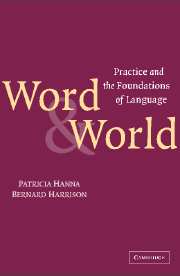Book contents
- Frontmatter
- Contents
- Preface
- Introduction
- PART I SCEPTICISM AND LANGUAGE
- PART II NAMES AND THEIR BEARERS
- 4 Russell's Principle and Wittgenstein's Slogan
- 5 The Name-Tracking Network
- 6 Rigidity
- 7 Descriptions and Causes
- 8 Knowledge of Rules
- PART III PROPOSITIONS
- PART IV PARADOXES OF INTERPRETATION
- EPILOGUE
- Notes
- Index
4 - Russell's Principle and Wittgenstein's Slogan
Published online by Cambridge University Press: 05 June 2012
- Frontmatter
- Contents
- Preface
- Introduction
- PART I SCEPTICISM AND LANGUAGE
- PART II NAMES AND THEIR BEARERS
- 4 Russell's Principle and Wittgenstein's Slogan
- 5 The Name-Tracking Network
- 6 Rigidity
- 7 Descriptions and Causes
- 8 Knowledge of Rules
- PART III PROPOSITIONS
- PART IV PARADOXES OF INTERPRETATION
- EPILOGUE
- Notes
- Index
Summary
Understanding Algernon
“Bunbury,” as all lovers of Wilde are aware, is the name of a mythical friend and chronic invalid invented by Mr. Algernon Moncrieff to justify his absence from London dinner-tables during the summer months. To those not in on the secret, Algernon is unwillingly responding to the voice of conscience urging him as a sacred duty to spend time at the bedside of his sick friend. Those in on the secret are aware that he is doing nothing so improbable as his duty. He is simply off enjoying himself in the country: “going Bunburying.” There is no Bunbury.
In what sense, then, can those not in the secret be said to understand the remark “Bunbury is ill again”? Those in the unphilosophical and rather numerous majority whose bookshelves are innocent of the works of Gottlob Frege, seeing no problem, may be inclined to respond that they understand it as well as, and in the same way as, any other English sentence employing a proper name. For analytic philosophers since Frege, by contrast, the issue has been a loaded one; one that, almost more than any other, brings into focus a nest of problems concerning the question that has been occupying us: how and to what extent are the spontaneities of language constrained by reality?
- Type
- Chapter
- Information
- Word and WorldPractice and the Foundations of Language, pp. 63 - 94Publisher: Cambridge University PressPrint publication year: 2003

